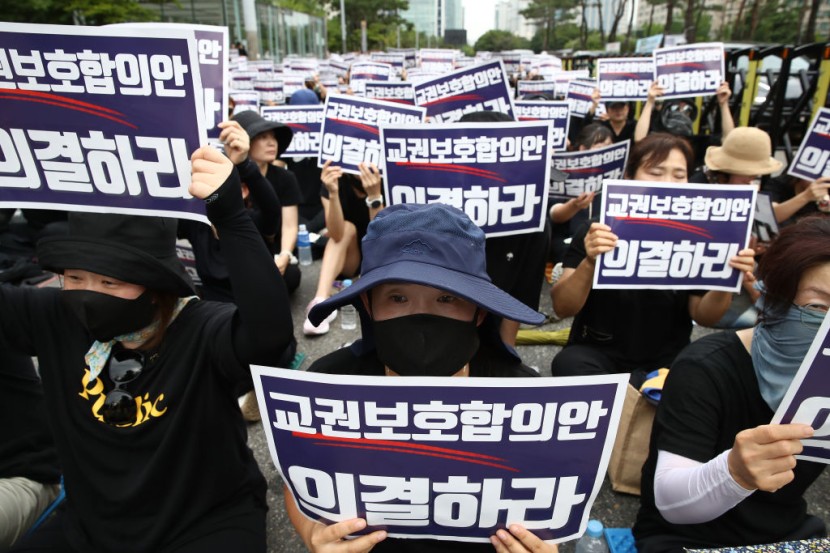Following a teacher's suspected suicide, which was widely attributed to the stress placed on educators in a nation known for its rigorous educational standards, hundreds of thousands of teachers are protesting in South Korea.
Angry teachers are requesting legal reform and increased protections because they claim they are subject to excessively demanding parents and even harassment, as reported by CNN.
The Korean Federation of Teachers' Associations cited rally organizers as saying that up to 200,000 protesters attended the demonstration on Saturday.
Moreover, organizers claim that 50,000 teachers stopped working on Monday and assembled in the nation's capital to remember the teacher who had passed away, despite earlier warnings from the authorities that a strike would be deemed "illegal."
According to a statement released in August by the nation's Education Ministry and the Seoul Metropolitan Office of Education, which conducted an inquiry into the death, the teacher had been teaching first-grade homeroom at the Seoi primary school in Seoul when she passed away on July 18 while on duty. The teacher's name was omitted.
The instructor had taken "the unfortunate decision to take an extreme choice," which is a typical euphemism in South Korea for suicide, according to Cho Hee-yeon, superintendent of the metropolitan education office, two days after she passed away.
While acknowledging "the reality that teachers' legitimate educational activities are not protected," Cho said police were still looking into the incident and suggested "special measures" to give instructors stronger institutional and legal protections.
Addressing Misconceptions About the Teacher's Death
Education authorities addressed a number of falsehoods that were circulating on social media after opening an investigation, including reports that a conflict between two pupils had contributed to the teacher's passing.
When officials revealed their conclusions in August, the education deputy minister claimed that the parents of both of the students implicated had attended a meeting with the teacher.
One parent made "multiple phone calls" for the teacher, and the teacher had "uncomfortable and anxious feelings about how the parent found out their personal mobile number," the student said.
The deputy minister went on to say that it was unclear as of yet whether the instructor had experienced any "verbal violence" from the parent.
Many educators in South Korea who had long complained that they were afraid to chastise their kids for fear of backlash finally reached a breaking point after the death. This mounting rage has been fanned by a number of further recent allegations of teacher suicides, which led to weeks of nonstop rallies before Monday's strike.
According to government statistics, between January 2018 and June 2023, 100 South Korean public school teachers—mostly elementary school teachers—committed themselves.

It is unknown how many of those suicides were related to the victims' jobs because the data does not define the causes that led to their deaths. However, a contentious law concerning child abuse that was introduced in 2014 has been criticized by many in the school community.
According to the law, anyone who suspects child abuse can contact the police without having to submit any supporting documentation. Following that, authorities may look into the claim, visiting the claimed abuse location (in this example, the schools), and speaking with pertinent parties.
Parents who believe their child has been wronged, teachers claim, may unfairly target them, putting their employment in peril.
More than 60 percent of the 6,243 respondents to a study by the Korean Teachers and Education Workers' Union indicated they had either personally been reported for child abuse or knew another teacher who had.
Read also: South Korea Takes Bold Step to Tackle Social Isolation, Offering 'Lonely Young People' Money
Growing Mental Health Problems in South Korea
The demonstrations and attention to teacher suicides are a reflection of South Korea's general mental health problems and long-standing complaints about its demanding educational system.
According to the health ministry of the nation, South Korea has the highest rate of suicide among the OECD countries, with that percentage rising among adolescents and young adults in their 20s.
Teenagers frequently list education as their top concern, and most Korean students attend private cram schools for extra instruction after regular school each day before continuing their own studies until late at night.
Related article: South Korea Pounded with Back-to-Back Stabbing Rampages Prompting Police To Tighten Security
© 2025 HNGN, All rights reserved. Do not reproduce without permission.








